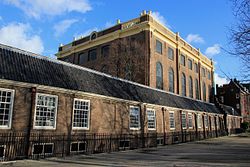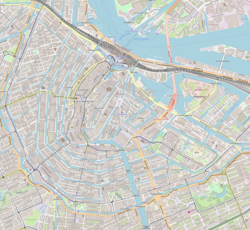Amsterdam Esnoga
| Portuguese Synagogue | |
|---|---|

Exterior of the Portuguese Synagogue in 2015
|
|
|
Location in the city centre of Amsterdam
|
|
| Basic information | |
| Location | Amsterdam, Netherlands |
| Geographic coordinates | 52°22′03″N 4°54′19″E / 52.3675°N 4.9054°ECoordinates: 52°22′03″N 4°54′19″E / 52.3675°N 4.9054°E |
| Affiliation | Orthodox Judaism |
| Rite | Sephardi |
| Country | Netherlands |
| Status | Active |
| Website | portugesegemeente |
| Architectural description | |
| Architect(s) | Elias Bouwman |
| Architectural type | Synagogue |
| Groundbreaking | April 17, 1671 |
| Completed | August 2, 1675 |
The Portuguese Synagogue, also known as the Esnoga (Ladino: אסנוגה), or Snoge, is a late 17th-century Sephardic synagogue in Amsterdam, completed in 1675. Esnoga is the Ladino word for synagogue.
The Amsterdam Sephardic community was one of the largest and richest Jewish communities in Europe during the Dutch Golden Age, and their very large synagogue reflected this. The synagogue remains an active place of worship and is also a popular tourist attraction.
The Sephardim (Hebrew for "Jews of Spain") were issued with the Spanish Royal Alhambra Decree in 1492, whereby they were given the choice of exile from Spain, or conversion to Catholicism, or failing to do either, execution. Of Spain's estimated 200,000 Jews at that time, around half converted; many by coercion, others because of social and financial pressures preventing their departure, and a few out of genuine religious conviction. They became Spain's Jewish-origin New Christians or conversos (i.e. "converts" to Catholicism).
Of the other half of Spain's Jews who did not convert, and instead chose exile, some sailed south (becoming the North African Sephardim), others went east (becoming the Eastern Sephardim), but most crossed the border west to Portugal.
In Portugal, Jewish life was interrupted only a few years later, when there too they were issued with the Portuguese decree against the Jews in 1496. While in theory, the Jews now in Portugal who chose not convert to Catholicism also had the option to be expelled (or executed) by 1497, the Portuguese king, not wanting a similar Jewish flight and brain drain as happened in Spain, in practice blocked Portugal's ports of exit, and subsequently reasoned that those who stayed behind agreed to become Christians by default. Thus the Jews in Portugal were forced to convert to Catholicism in 1496 after the decree and, all but a few who did manage to flee, became Portugal's Jewish-origin New Christians or conversos.
...
Wikipedia

